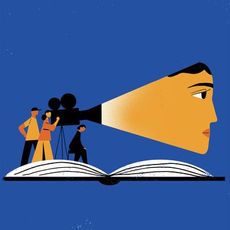Taking It to the Limit: What Happens When You're Addicted to Overspending?
These women hold down serious jobs, stopped partying years ago, and aren't usually risk-takers—except when it comes to their credit cards.

Cia Glover surveyed that afternoon's haul from inside the large San Francisco department-store dressing room. A sleek, black pencil skirt. A skull-patterned sweater. A silky, beaded cocktail dress. The 36-year-old nonprofit corporate sponsorship manager felt triumphant: "Like, I'm going to look so cute, and I deserve it," she says. She quickly calculated that the day's tally would top out around $1,200. It was more than she'd spent in months, but it was all going on her store credit card, so she wouldn't have to face questions from her husband about the charges. It was the fall of 2013, and after racking up more than $40,000 in combined credit-card debt between the two of them over five years—the result of expensive meals out, friends' weddings, and impulsive trips—the couple had finally put their finances in order. They'd sought advice from a financial planner, started aggressively paying off their four credit cards, and built up a small savings account.
But after more than a year of careful spending, Glover's resolve wavered. It was right before the holidays; she had plans to visit friends and family across the country, and she needed something to wear. Since she'd had a baby earlier that year, some of her old clothes no longer fit; plus, she felt like she never did anything for herself anymore. After responsibly using most of her end-of-year bonus to pay off debt, Glover decided to treat herself to a shopping spree and set up an appointment with a personal shopper.
Glover likens the rush of a spree to the embarrassed excitement of one-night stands or drunken binges in her 20s. "Now, instead of those kinds of things, I go to Bloomingdale's."
"It feels good to feel bad," she says. "That cute pair of shoes that I don't really need—buying them gives me a thrill, and it's in part because I know I shouldn't be doing it." And with a high-pressure, six-figure job and a young child, opportunities to let loose can be few and far between. Glover likens the rush of a spree to the embarrassed excitement of one-night stands or drunken binges in her 20s. "Now, instead of those kinds of things, I go to Bloomingdale's," she says. "I feel really good in the moment. It's afterward that I feel guilty." In all other aspects of her life, she explains, she's responsible and measured. "I don't think of myself as a huge risk-taker," Glover says. But "because debt can be such a private thing, there's not that fear of getting caught. I'm more liable to rack up a huge bill shopping than to do something daredevil-y. But acquiring all that debt certainly is risky, too."
We all make an imprudent purchase every once in a while, but for some women, the highs and lows of constantly accruing and paying off credit-card debt can be what keeps the weight of adulthood at bay. Shaunna Harry, a 36-year- old Manhattan-based marketing manager, can't seem to stop herself from this type of financial yo-yo dieting. "I have this super-focused, responsible side, but there's also this easy-breezy side to me. It's an internal battle," she says. A few years ago, with the help of a large tax return and careful budgeting, she paid off $10,000 in credit-card debt. But eventually, her wild-child side took over again.
"It's just exciting. Once I buy something, I can't stop."
"I have this little voice in the back of my head that I turn off when I'm spending too much," she says. "I feel like if you don't take risks when you're younger, it's all going to come back to you. You're going to be married with kids, and you're going to be like, I didn't live my life." And so she has, debt be damned: In the past few years, Harry has skied Vail and Breckenridge in Colorado, hit Art Basel in Miami Beach, seen dance performances once a week, and gone through spurts of free-fall online shopping ($1,000 on six maxi dresses here, $1,500 on furniture there), all with the help of three credit cards. "It's just exciting," she says. "Once I buy something, I can't stop. I don't want to have debt, but I know I'll take care of it. I'll figure it out. I've done it before." Her combined credit-card balance then hovered around $9,800.
Whether we're doing it consciously or not, a lot of us play Russian roulette with our credit cards. Nearly half of American households with at least one credit card carry a balance, says Gary Mottola, a researcher at the FINRA Investor Education Foundation. (Per a 2014 Federal Reserve report, the average amount owed per household is $5,700. Other research shows that women's average credit-card debt is $5,245, which is 22 percent less than that of men.) This debt can't be chalked up to youthful indiscretion: According to the U.S. Census Bureau, credit-card debt tends to be lowest among young people and increases with each age bracket until the age of 65. This holds true even for those of us who are otherwise money- savvy. According to Mottola, almost a quarter of women with "high financial literacy"—i.e., who have a basic understanding of how things like interest rates and mortgages work—still play it fast and loose with their credit cards.
"You're taught you should take good care of your money and make smart decisions, but we all get tired of being so practical and adult all the time," says credit-card expert Beverly Harzog, author of Confessions of a Credit Junkie. "You've got this part of your psyche that just needs some adventure." Could it be that racking up crazy credit-card debt and then working insanely hard to pay it down is a way to cultivate a bit of excitement? And if so, why would anyone be drawn to doing something they know will end up causing a great deal of stress and anxiety?
Stay In The Know
Get exclusive access to fashion and beauty trends, hot-off-the-press celebrity news, and more.
It might sound counterintuitive, but there's a strange appeal to putting oneself in harm's way, notes Scott Rick, Ph.D., a behavioral decision researcher and professor at the University of Michigan. Situations that are a little bit scary or stressful can activate excitement, he notes— as long as we believe deep down that we'll ultimately be able to handle it. In that sense, accruing credit-card debt can seem like a relatively safe way to dip our toes into risk-taking waters. "Reckless spending is controlled mischief," he explains. "It doesn't jeopardize the buttoned-up life the spender has worked hard to achieve, but there's still some financial danger." This can be especially true for high achievers. "Success in a lot of domains requires supreme self-control," he says. "It can be numbing." For women who are particularly driven, building up credit-card debt can provide a more intense version of the excited fear we feel when riding a roller coaster or watching a horror movie.
"You're taught you should take good care of your money and make smart decisions, but we all get tired of being so practical and adult all the time."
Plus, unlike other forms of transgression, like getting a tattoo or drinking too much, credit-card debt is easy to hide. Maria Stephens, a 27-year-old software engineer making six figures in Atlanta, racked up $11,000 in debt over years of charging meals out with friends and buying things like the $600 designer laptop bag that cost almost as much as her new computer. At the height of her spending, she had seven credit cards, which she used to amass over 30 pairs of shoes and more than 50 handbags. The child of frugal parents with whom she emigrated from Russia as a child, Stephens skillfully juggles a demanding job and has had fewer drinks in her lifetime than most people her age have in a week. But each impulsive charge brings her both a pang of guilt and the giddy high of knowing she did something she shouldn't have. "The binges are usually the only time I lie," Stephens says, admitting that neither her parents nor her husband knew the extent of her financial issues. "It's my own little secret. There's a rush associated with it."
Stephens' experience doesn't surprise Kate Levinson, Ph.D., a psychotherapist and the author of Emotional Currency: A Woman's Guide to Building a Healthy Relationship With Money. "Secrets carry emotional power," she says, noting that something about the hidden nature of the spending and debt cycle makes it particularly satisfying. And secretly battling credit-card debt could be a way for successful women to let themselves off the hook a little bit, Levinson explains. "It can be an attempt to balance out this relentless demand for perfection or achievement," she says.
This theory resonates for 37-year-old Alia Akkam, a New York–based writer who spent five years diligently paying off a credit-card debt of $15,000. Two years later, after trips to Copenhagen, Denmark; Singapore; and Vienna, where she often stayed in hotels that cost $300 a night and ate at the cities' best restaurants, her debt was back up to $12,000. Akkam wonders if her overspending might be a way to stretch her identity beyond its normally upstanding confines. "I'm a very neurotic, uptight, worried person," she says. "So maybe the financial disarray is a way of bringing that spontaneity and adventure into a life that's pretty structured and mature."
It's also possible that some women get a thrill from the challenge of putting themselves into financial dire straits and then climbing back out of it. Just as there's a spender's high, paying down debt can be intensely heady. After years of struggling to meet her $600 monthly minimum payments, Stephens decided to take control of her finances by selling off her furniture and clothing. She describes the frenzy of getting rid of her stuff as "thrilling, way more exciting than anything I'd ever bought." She made $2,000 and put all of that money toward her bills. With the help of a signing bonus at her new job, she now no longer carries a balance on her credit cards. "It's really challenging," she says of tackling her debt for what she hopes will be the last time. "But it feels awesome."
It's also possible that some women get a thrill from the challenge of putting themselves into financial dire straits and then climbing back out of it.
Chronic up-and-down debt can be a dangerous way to act out, says financial expert Elle Kaplan, CEO and founding partner of LexION Capital. "You're potentially going at a speed you can't keep up," especially if you lose your job or get hit with unexpected bills. Women who are constantly juggling credit card payments, adds Kaplan, are "staying on a financial treadmill and not getting at all ahead." If the bulk of your discretionary income is going toward paying off debt, it won't be easy to fund other goals, like saving for retirement or a house. Even if you pay your credit-card bills on time and make at least the minimum payments, Kaplan says, running up a large balance relative to your credit limit can make it more difficult—and costly—to get a mortgage or car loan. "Even if you do get approved, having the best credit possible is vital since interest rates depend on your score," she says. "A percentage point difference can equal hundreds of thousands in savings over the life of a mortgage."
Getting off the debt roller coaster isn't easy. "You can't stop the cycle just by saying you're going to stop it. You have to have insights into how you learned this behavior and how it's serving you," says Levinson. "Maybe you're feeling too rule-bound in other areas of your life. Maybe you're not doing work that you really want to do. Maybe you're not living in a city where you want to live." Kaplan suggests finding a more productive form of thrill- seeking, like one former overspender she knows who took up bike riding. She began pedaling through busy New York City streets as a way to get that same rush. And thankfully for Cia Glover, she was able to buckle down again after her department store splurge, which, in the past, would have led her right back into a spending abyss. "There's certainly not a lot of glamour in it," she says of her commitment to paying off her debt. "But there is something satisfying about slowly chiseling away."
This article appears in the May issue of Marie Claire, on newsstands now.
-
 These Royals Could Step Up to Help Prince William When He's King "If He Calls on Them"
These Royals Could Step Up to Help Prince William When He's King "If He Calls on Them"Three members of the Royal Family are likely to pitch in with duties down the line.
By Kristin Contino Published
-
 Why King Charles "Refuses" to Give Kate Middleton Advice About Becoming Queen
Why King Charles "Refuses" to Give Kate Middleton Advice About Becoming Queen"For much of the same reason, Camilla has not felt compelled to speak with Kate about what it's like to be queen."
By Amy Mackelden Published
-
 How Prince Harry Honored One Man's Unexpected Request While Helping California Wildfire Victims
How Prince Harry Honored One Man's Unexpected Request While Helping California Wildfire VictimsThe Duke of Sussex reportedly went incognito to find a special item for an elderly man affected by the disaster.
By Amy Mackelden Published
-
 Hollywood Loves Books
Hollywood Loves BooksMany new streaming options mean big payoffs for authors when their work is optioned.
By Kate Dwyer Published
-
 The 'Friends' Cast Are Reportedly Getting as Much as $4 Million for HBO Max Reunion Special
The 'Friends' Cast Are Reportedly Getting as Much as $4 Million for HBO Max Reunion SpecialDAY-UM.
By Kayleigh Roberts Published
-
 No, Your Down Payment Doesn't Have to Be 20 Percent
No, Your Down Payment Doesn't Have to Be 20 PercentThere are pros and cons of putting down less.
By Anni Irish Published
-
 Three Industry-Changing Founders on Building Your Own Empire
Three Industry-Changing Founders on Building Your Own Empire"You give power to the things you spend time worrying about," said Julia Hartz at Marie Claire's Power Trip.
By Juliana Ukiomogbe Published
-
 How to Pay Off Your Student Loans, Thanks to Freeform and Scholly
How to Pay Off Your Student Loans, Thanks to Freeform and SchollyThe network and scholarship app are partnering up to help pay off your debt in honor of the season two premiere of 'Grown-ish.'
By Rachel Epstein Published
-
3 of Your Biggest Financial Worries—Answered
Introducing our newest money columnist Gaby Dunn, who is here to help.
By Gaby Dunn Published
-
 6 Actually Impactful Ways to Give Back This Season, Because You're More Motivated Than Ever
6 Actually Impactful Ways to Give Back This Season, Because You're More Motivated Than EverLet's do this. 👊
By Samantha Leal Published
-
Holiday Time: How Much Money Should I Really Be Spending on People?
Gift guide
By Samantha Leal Published